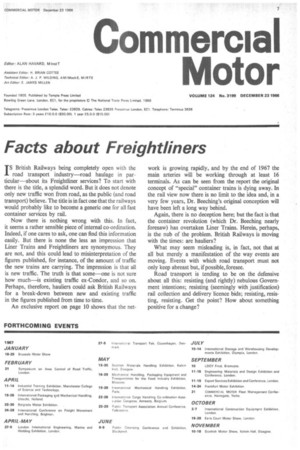Facts about Freightliners
Page 9

If you've noticed an error in this article please click here to report it so we can fix it.
IS British Railways being completely open with the road transport industry—road haulage in particular—about its Freightliner services? To start with there is the title, a splendid word. But it does not denote only new traffic won from road, as the public (and road transport) believe. The title is in fact one that the railways would probably like to become a generic one for all fast container services by rail.
Now there is nothing wrong with this. In fact, it seems a rather sensible piece of internal co-ordination. Indeed, if one cares to ask, one can find this information easily. But there is none the less an impression that Liner Trains and Freightliners are synonymous. They are not, and this could lead to misinterpretation of the figures published, for instance, of the amount of traffic the new trains are carrying. The impression is that all is new traffic. The truth is that some—one is not sure how much—is existing traffic ex-Condor, and so on. Perhaps, therefore, hauliers could ask British Railways for a break-down between new and existing traffic in the figures published from time to time.
An exclusive report on page 10 shows that the net
work is growing rapidly, and by the end of 1967 the main arteries will be working through at least 16 terminals. As can be seen from the report the original concept of "special" container trains is dying away. In the rail view now there is no limit to the idea and, in a very few years, Dr. Beeching's original conception will have been left a long way behind.
Again, there is no deception here; but the fact is that the container revolution (which Dr. Beeching nearly foresaw) has overtaken Liner Trains. Herein, perhaps, is the nub of the problem. British Railways is moving with the times: are hauliers?
What may seem misleading is, in fact, not that at all but merely a manifestation of the way events are moving. Events with which road transport must not only keep abreast but, if possible, foresee.
Road transport is tending to be on the defensive about all this: resisting (and rightly) nebulous Government intentions; resisting (seemingly with justification) rail collection and delivery licence bids; resisting, resisting, resisting. Get the point? How about something positive for a change?












































































